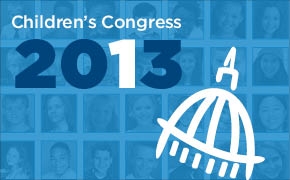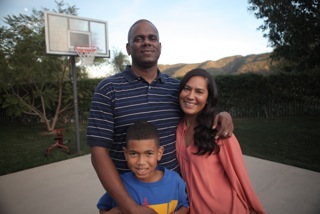JDRF Announces Delegates for its 2013 Children’s Congress
— Children and celebrity advocates will appeal to Congress for continued support of
research that will lead to a world without type 1 diabetes—
Media Contact:
Michael Cook, 212.479.7510, mcook@jdrf.org

Washington, D.C., April 22, 2013 – Approximately 150 children and teenagers throughout the United States, and several from around the world, have been selected to travel to Washington, D.C. this summer to represent their state and country and remind Congress and the Administration of the critical need to find better treatments and a cure for a disease they live with every day—type 1 diabetes (T1D).
These children—ages 4 to 17, representing all 50 states and the District of Columbia—will come together in the nation’s capital, to talk with lawmakers about the challenges of living with T1D and the need for continued research to eliminate those challenges. The JDRF 2013 Children’s Congress runs from July 8 to 10. Joining these children will be six international delegates traveling from Australia, Canada, Denmark, Israel, the Netherlands, and the United Kingdom. The delegates and their international counterparts will convey a clear message to the U.S. government that diabetes is a global problem that requires a global effort.
The event, held every other summer, will once again be led by JDRF International Chairman Mary Tyler Moore, and will include congressional visits by the delegates and a hearing during which Ms. Moore, select delegates, researchers, and community leaders will testify on the need for continued funding for T1D research, under the theme of “Promise to Remember Me.” This theme serves as a powerful call to lawmakers to remember the struggle of living with the disease, and the importance of supporting and funding research to reduce the burden of living with T1D until a cure becomes available.
“These outstanding children and their families all understand, as I do, that type 1 diabetes tests us every day,” says Ms. Moore, who has had T1D for more than 40 years. “Children’s Congress gives all of us a voice to urge Congress to increase its support of research, which is essential to reducing the burden of this disease on us and on our country.”
Serving as chair for the 2013 Children’s Congress is Angie Platt, who was in Washington, D.C. two years ago with her son Jonathan, now nine, a delegate for the 2011 Children’s Congress. As chair of the event, Angie will help engage, support, and energize the delegates and their families during the advocacy efforts on Capitol Hill.

“We are honored and inspired by the opportunity to serve as chair family for the 2013 Children’s Congress. Our family has seen first-hand the difference that this campaign makes by giving a voice to those most affected by type 1 diabetes in hopes of strengthening the resolve of those in office to cure, better treat, and prevent the disease,” says Mrs. Platt. “This year’s delegates are truly an extraordinary group that will be up to the task. Each and every one will be prepared to share their story to help Congress understand why they need to ‘Promise to Remember’ all the children and families affected by this disease.”
Children were selected by a volunteer-based committee, led by Mrs. Platt and her co-chair, Camille Nash, and represent communities from across the nation. “After reviewing the submissions from all of this year’s applicants we were overwhelmed by their commitment to making an impact for people with type 1 diabetes,” says Platt. “Choosing just 150 delegates from the pool of nearly 1,500 applicants for this year’s Children’s Congress was an incredibly challenging process.” Nash and her daughter attended the JDRF 2005 Children’s Congress.
For a video of highlights from the 2011 Children’s Congress, including Jonathan and our dedicated celebrities, see below.
[youtube http://www.youtube.com/watch?v=k1SzCwJ6f8Q?rel=0]
About Children’s Congress
The JDRF Children’s Congress program was inspired by then eight-year-old Tommy Solo from Massachusetts in 1999. He overheard adult JDRF volunteers talking about going to Washington, D.C. to talk to Congress, and thought it would be great if children could go, too, because their voice also needed to be heard. Children’s Congress inspires lawmakers to remember the children who live with T1D when making decisions about medical research and voting on other important federal issues relating to diabetes. The young delegates’ stories, told in their own words, are often more powerful than almost any other type of legislator education.
The idea quickly became a well-developed event, first held in 1999. Since then, seven successful Children’s Congresses have occurred, growing in sophistication, one every other year (1999, 2001, 2003, 2005, 2007, 2009, and 2011).
Today, Children’s Congress brings 150 children with T1D, and one parent or guardian each, to Washington, D.C. Children’s Congress participants represent all 50 U.S. states, the District of Columbia, and several countries around the world. They come together as advocates to meet on Capitol Hill with Members of Congress and other key federal policymakers, to help educate them about the critical need for federal funding of T1D research.
About JDRF
JDRF is the leading global organization funding type 1 diabetes (T1D) research. JDRF’s goal is to progressively remove the impact of T1D from people’s lives until we achieve a world without T1D. JDRF collaborates with a wide spectrum of partners and is the only organization with the scientific resources, regulatory influence, and a working plan to better treat, prevent, and eventually cure T1D.
As the largest charitable supporter of T1D research, JDRF is currently sponsoring $530 million in scientific research in 17 countries. In 2012 alone, JDRF provided more than $110 million to T1D research. More than 80 percent of JDRF’s expenditures directly support research and research-related education. In 2012 Forbes magazine named JDRF one of its five All-Star charities, citing the organization’s efficiency and effectiveness.
For more information, please visit jdrf.org.